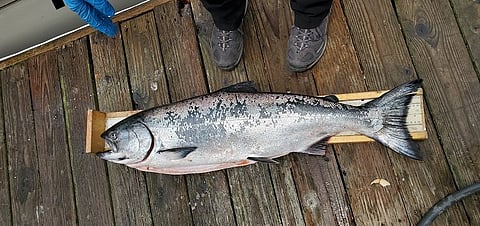

At the end of the last week, the Pacific Fishery Management Council voted to close the entire season for commercial and recreational wild salmon fisheries due to 2023 abundance forecasts in California and parts of southern Oregon. If it goes forward, closure measures would begin in mid-May.
The action follows projections that California Chinook salmon abundance is at historic lows. Charlton H. Bonham, the Director of the California Department of Fish and Wildlife said: "The state is committed to ensuring the long-term survival of our salmon runs and supporting our struggling fishing communities". He also stated that they are looking at possible options "to bring relief as soon as possible to fishing businesses". These include the costs of maintaining the fishermen's commercial licenses and the lost income once the season is closed completely.

As indicated by Newsom Administration and Bonham, the climatic conditions and associated impacts on spawning and rearing habitats have been detrimental to the species over the past three years. A prolonged drought combined with wildfires, harmful algal blooms, and changes in ocean forage is a severe combination. The final result is one of the lowest populations in history for Sacramento River Fall Chinook salmon and Klamath River Fall Chinook salmon.
Four days ago, California Governor, Gavin Newsom, and Lieutenant Governor, Eleni Kounalakis, requested a Federal Fisheries Disaster Declaration. This declaration for the chinook salmon would begin the process to apply for federal assistance to help these fishery-dependent communities during this time of closure.
The letter from U.S. Secretary of Commerce, Gina Raimondo, explained the magnitude of the events. "The expected closure of the 2023 California commercial salmon fishery will result in a loss of 100 percent of the 5-year average annual ex-vessel value of $15,033,200". A number that does not include secondary services, such as commercial fishing, and revenues from charters, guides, and recreational fishing.
"This decision, while difficult, is intended to allow salmon to recover in order to provide future fishing opportunities". Bonham explained.
